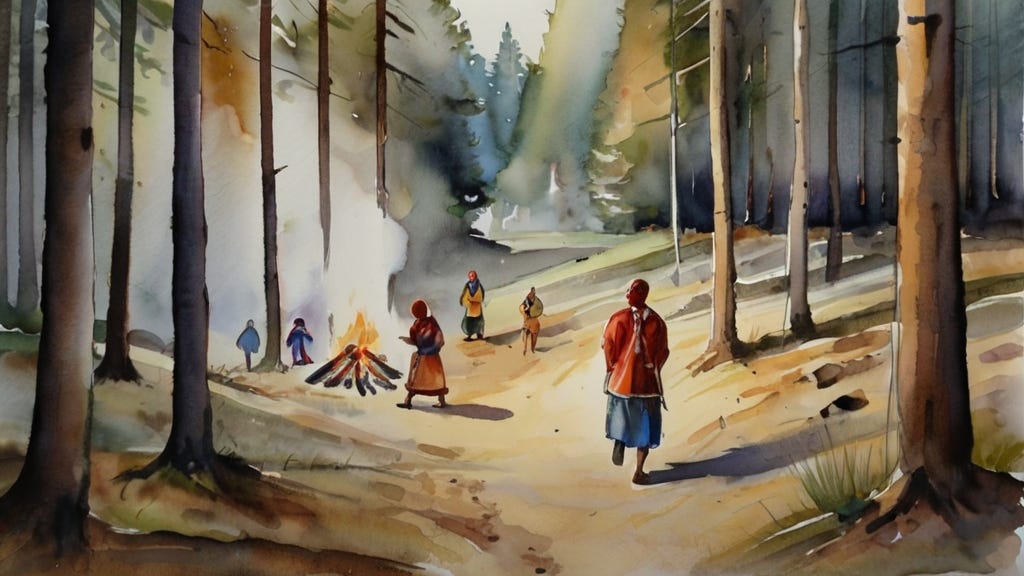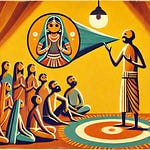Let’s open with a poem.
Belonging.
She gives you all you need. Friendship. Safety. Meaning. Being rid of that pesky loneliness.
With her you overlap others. Share deep parts of yourself. Yet if you want this always, you must compromise. Give up the parts of you that rub them the wrong way. Sacrifice uniqueness to relax into unity.
Fearing loneliness, you'll take conditional belonging instead. Those conditions will rob you of your itch, of your restless yearning. Safety, enoughness, togetherness. A balm on your deep wound. Not healing, but sealing.
And yet, belonging is not all tricks to test your soul. As you find your deeper layers. May you find deeper layers of belonging as well. May you find strata that you have always shared with others, a bedrock of being. A layer so deep that you share it with kind and opponents alike, with human as much as cedar and squirrel.
May this bedrock belonging claim you whole, with all your jutting edges and inconvenient truths, your strangely shaped gifts and your occasional bouts of lonely longing for that surface belonging which would compromise you.
The Belonging of an Alder
I'm sitting in a forest near where I live, and thinking about belonging.
The alder trees around me, the bulrushes in the pond before me, the water striders skimming across the pond surface; all of them belong to the forest.
The leaves on these alders have now fallen to the ground, and are gradually becoming part of the it. Part of the soil. When in springtime the alders will again sprout leaves, they will draw their nutrients from the soil. Dying leaves become living leaves, in new arrangements. This is a kind of belonging: to be of a community of life.
For us humans, this word community connotes a place where our hearts, minds and soul gifts are welcome. Asked for, received, incorporated in the old sense of the word: becoming the body and thought forms/heart forms of that community. In business, it is one thing to belong to a particular vocation, and another to be an integral to that vocation. To have colleagues and even competitors with whom to exchange insights and practices.
Each of us were cared for in our upbringing, whether by biological parents, step parents, adopted parents, by people running an orphanage, or by a mixture of these and others. If we hadn't been cared for at that time in our lives when we were babies and young children, when we were so dependent, we simply wouldn't be here. Yet we want more care than is needed for our survival.
Stories as Miniature Worlds
I find it easier to see the community's that I'm in if I consider myself to be in a story. A story can be the world in miniature, like a model railway, with hills and trees and trains. The trees might be about as tall as our thumbs, the people as tall as our pinky fingernail. It’s all easier to conceive than a vast railway stretching across the country, running through cities full of thousands or millions of full sized human beings, and surrounded by hills weighing ton upon ton.
Likewise, a story can be a model. It’s easy to see where a character belongs. Gimli the dwarf? Well, he belongs to the dwarfs. Legolas the elf belongs to the elves. Even loner characters, like cowboys, belong among horses and arid lands and saloons. We know their habitat. It can be trickier to identify the circles of belonging in our own lives.
Fictionalise your Life
Here’s me in the third person.
Once there was a man, somewhere in the middle of his life, and out on a walk in a forest. He was looking at birds pecking bugs within moss-covered logs. He was hearing the calls of ravens, and watching giant human-made steel birds cross the sky in strangely straight lines. He was staying in a farming community, where he felt some community, but was called to move on. He wanted to be with people who would call forth his gifts. He was learning again to be alone without being in loneliness. To be in solitude.
There's a little snapshot of my life right now, in the form of a story. That’s a tool I keep returning to, to speak about myself in the third person. There was a child, a man, a woman or two spirit person. Or you might even conceive of yourself as an owl, a raven, a buffalo, an elephant, depending on what feels true to your experience in the moment. Why not try it now?
You can use this same third person tool to speak about yourself in your vocation. For myself I’ll say, Once there was a man who had been a monk for many years, studying and practicing the mythology of a distant eastern land. When he returned to his own land, he struggled to apply what he had learned to very different situations. He had learned much about stories, and so he worked to bring this understanding into the fields in which he found himself, to make relevant to the people he met the things he had learned. He strove to join the ecosystem in this place.
You could get into more detail, giving more specifics about your business, but it's easy to get bogged down. Instead, I suggest staying zoomed out to get a bigger picture on your situation. You can use this same third person tool to speak of others.
Moving Between Circles of Belonging
Each of us are in multiple circles of belonging. They may not all be comfortable or even healthy, but we’re in there. There's family, vacation, friends, the natural world as a whole, and also particular places where we may walk or camp, places that may be close to us now, or far away.
I'm part of this farming community here. I'm also connected with people who are in different circles of friends on this island in the Pacific Northwest. These circles overlap. I know people in different countries. There are people I'm connected to for work, and there's often an overlap with friendship. There's this forest that I'm inside now, where I've been taking walks for some months, and gradually coming to know the trees, and the calls of the birds (in the audio recording of this article).
It's helpful to remember that we are in multiple circles of belonging, because in any given circle there may be some trouble. For many people, the circle of family is troubled. Some have healthy, loving parents and siblings, with whom they can share their hearts. Many of us don’t, and for most of us there's an odd mix. For many, family brings more grief than the sustenance of belonging. Yet we are interdependent beings.
The good news is that if there is trouble in one circle of belonging, we may find strength in another.
To be continued in part 2













